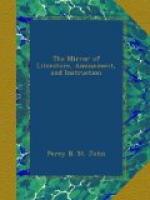The following singular, though highly useful custom, formerly existed in England: viz.—“There was usually carried before the mayde, when she shoulde be married, and came to dwell in hir husbande’s house, a distaffe, charged with flaxe, and a spyndle hanging at it, to the intente shee might bee myndeful to lyve by hir labour.” The foregoing is extracted from “A Treatise wherein dicing dauncing, vaine plays, or enterludes; with other idle pastimes, commonly used on the Sabbath-day, are proved by the authoritie of the word of God, and ancient writers; by John Northbrook, minister and preacher of the word of God.”
JUVENIS.
* * * * *
NATIONAL CAPRICES.
The Persian, it is said, will endure suffocation before he will blow the fire with his breath; the Indian places supreme perfection in besmearing himself with cow-dung; the Mussulman believes himself purified from all his sins by the ablution of his head and arms: the only question with him is, “whether the ceremony ought to begin at the elbow or at the points of his fingers;” but so great is the difference of opinion on this head, that if two Mahometans meet on a journey, and accost each other with brotherly affection, by the one beginning his ablution at his fingers’ ends, and the other at his elbow, they instantly separate and become mortal enemies.
WALTER E.C.
* * * * *
RETROSPECTIVE GLEANINGS.
* * * * *
THE POST OFFICE.
In the year 1635, Charles I. directed his postmaster to open a communication between London and Edinburgh, &c. &c. In 1653-4, the revenues of the Post-office were farmed by the Council of State and Protector, at 10,000_l._ per annum. Some idea of their progressive increase may be gained by the perusal of the following:—
1664 L21,000 1674 43,000 1685 65,000 1688 76,318 1697 90,505 1710 111,467 1715 145,227 1744 235,492 1775 345,321 1785 463,753 1793 607,268 1814 2,005,987
Since 1814, Mr. Macculloch considers the revenue of the Post-office to have been about stationary.
ANTIQUARES.
* * * * *
BEDE’S CHAIR.
[Illustration: BEDE’S CHAIR.]
This curious relic is preserved in the vestry of the ancient church of Jarrow, two miles from South Shields, in the county of Durham. It is a large chair of oak, traditionally said to have been the seat of the VENERABLE BEDE, the pre-eminent boast of the monastery, a portion only of the church of which establishment remains at Jarrow. The chair is very rudely formed, and, with the exception of the back, is of great age.




